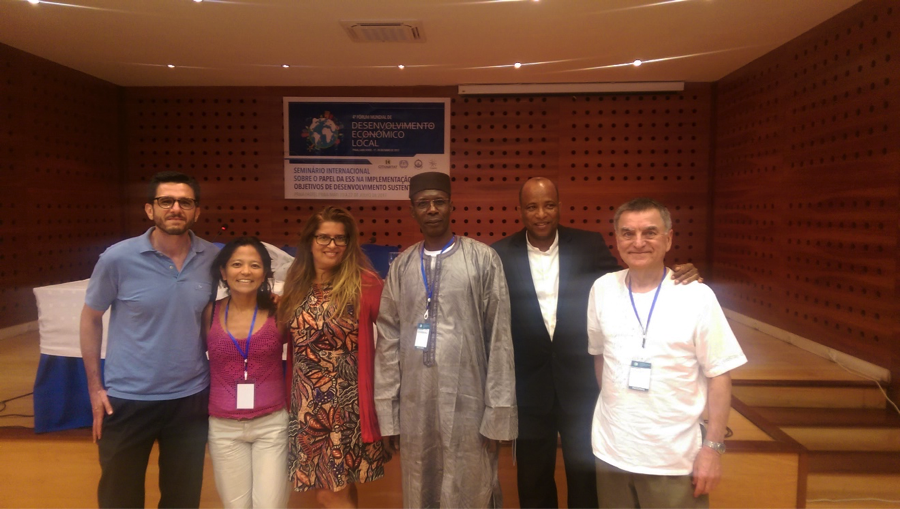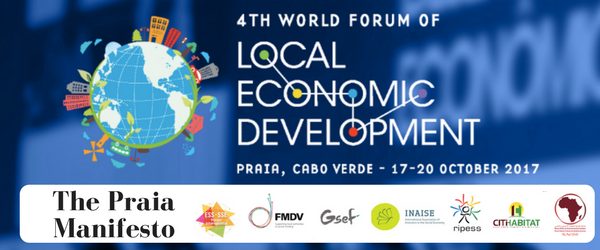The 4th Global Meeting on Local Economic Development (LED) was held in Praia, Cabo Verde, from 17 to 20 October 2017.
The theme of this year’s meeting is:
Local Economic Development as a comprehensive framework to localize the Sustainable Development Goals: addressing rising inequalities.
The theme of the event is totally aligned with a recent announcement by the UN Secretary General António Guterres of the importance of localizing the 2030 Agenda.
As established by the UN Interagency Taskforce on the Social Solidarity Economy (SSE) in the 2014 Position paper in 2014 and in a 2016 Statement, the potential of SSE for sustainable development and for the localization of the SDGs is very important. In that sense, SSE has been one of the important themes for the 4th Forum.
[su_custom_gallery source=”media: 270486,270487,270488,270489″ limit=”4″ link=”lightbox” width=”230″ height=”150″ title=”never”]
After the UN TASKFORCE announced this event, RIPESS decided to get involved considering that most of our members are active in building SSE at the local level, and thus on LED. RIPESS, and FMDV are formal Associates of the event alongside UN Agencies and local authorities network such as United Cities and Local Governments (UCLG).
The RIPESS involvement in the LED preparations
Our preparations started in January in partnership with Jacinto Santos who was involved in the National Organising Committee of Cabo Verde. Jacinto Santos leads an important NGO in Praia and is also President of a Portuguese speaking international SSE network created last year.
Two preparatory meetings for the 4th Forum have been held. A Latin American and Caribbean Forum was held in late on June 27-30 in Cochabamba, Bolivia. Raul Luna Rodriguez from Peru, the RIPESS LAC coordinator, participated in the Forum. In July, Yvon Poirier, the RIPESS Vice-Coordinator and Madani Koumaré, the RAESS (RIPESS-Africa) President, attended a preparatory Symposium on Praia in July (20 to 22). Since the main partner for the event was the ILO South-South and Triangular Cooperation program, most participants were from the South (Africa).

Preparatory meeting in Praia in July 21th. Left to right: Andrea Agostinucci (UNDP), Adrea Y.S. KANIKADAN (UNILAB-Brasil), Anita Amorim (ILO), Madani Koumaré (RAESS), Jacinto Santos (Citi-Habitat, Cabo Verde), and Yvon Poirier (the RIPESS Vice-Coordinator)
Note: The RIPESS delegation for the 4th Forum was Judith Hitchman and Madani Koumaré
The Praia Manifesto
RIPESS and FMDV – Global Fund for Cities Development, were official Associates for the Forum. Our two organisations decided to prepare a Manifesto, in partnership with other organisations, in order to provide a specific vision on how SSE organisations are key to LED and the SDGs. We hope that RIPESS members, and all other SSE organisations, will appropriate the content of the Manifesto.
The Manifesto is available in English and in French.

Why this is important for RIPESS members
Our members at the grassroots struggle daily to improve the livelihoods of the people at the community/local level. SSE organisations have the expertise and the solutions to most of the problems at the local level, be it housing, food, health, education, job creation, increasing income for people in need, providing services such as recycling, but also in culture and in arts. This can be lifting themselves out of poverty. For example, a women’s cooperative producing food improves income for them and their families, empowers themselves, and strengthens their role in civil society. Based on solidarity in the community, SSE creates healthy communities and helps struggle against inequalities and exclusion. By building stronger local economies, SSE organisations are at the forefront of sustainable development. And this was the case before international organisations even used the expression sustainable development.
The adoption by the UN of the 17 Sustainable Development Goals in 2015 is very important since in fact, most goals are related to existing activities in SSE. In some way, this is an important recognition, and at the same time an opportunity for SSE to actively implement sustainable development.
Since SSE organisations are at the grassroots, in cities, in towns and in rural regions, they are in a great position to demonstrate to their local authorities their importance for LED which is important to tackle the SDGs.
SSE organisations should outreach to the different levels of government and demonstrate that they are part of the solution to the problems faced by citizens.





Leave A Comment